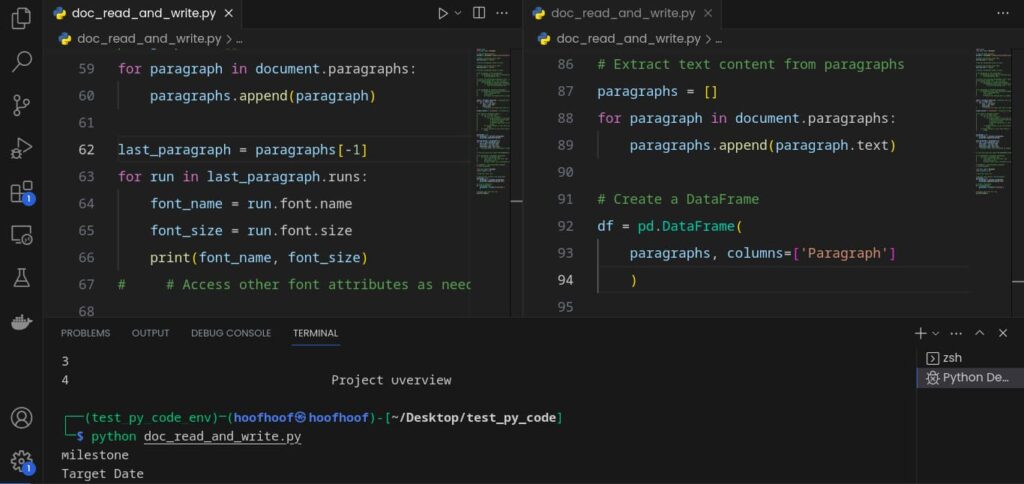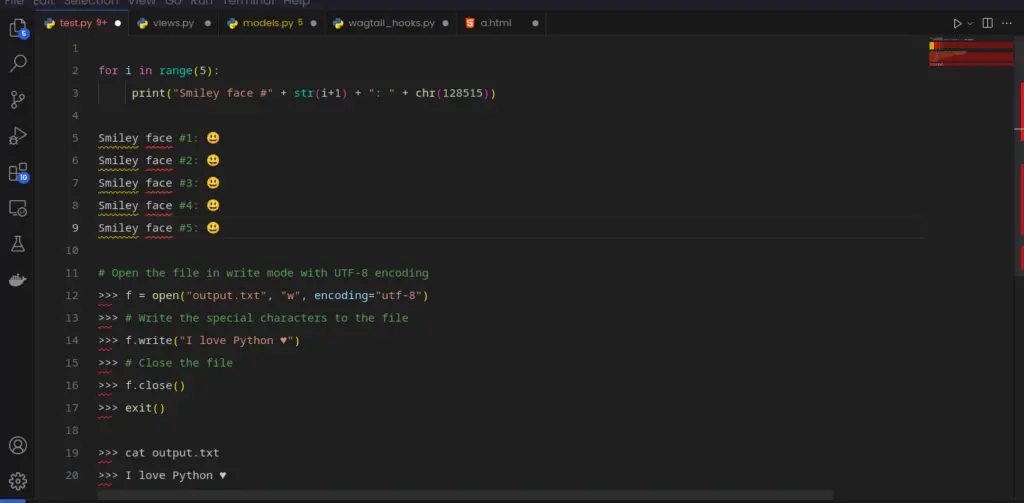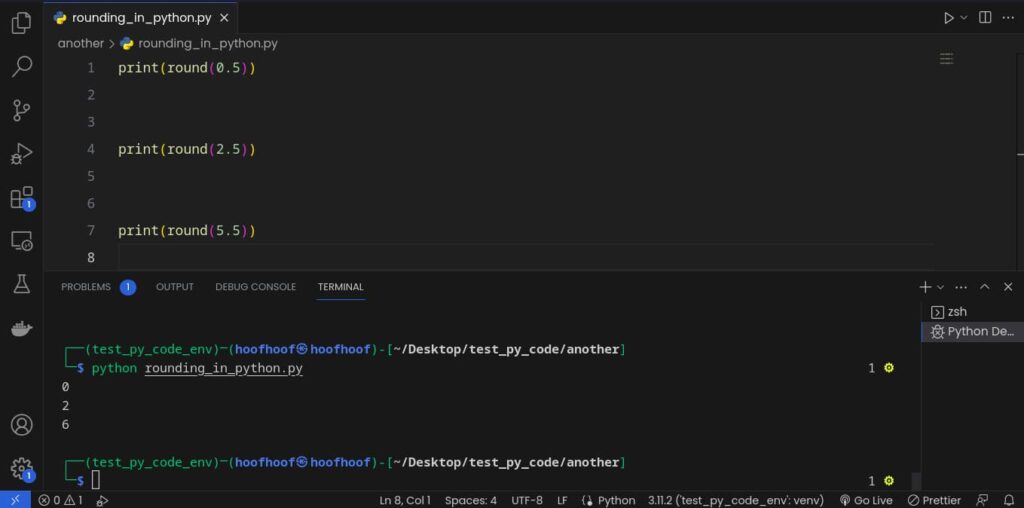You can use global variables as arguments for Python functions.
Global variables are accessible from within functions without explicitly passing them as arguments, as functions have access to the global namespace.
In programming, global variables are variables that are defined outside of any specific function or block of code, making them accessible to the entire program. They are stored in the global namespace, which is a shared area of memory that can be accessed by all functions and code segments.
Functions can directly access and modify global variables without needing to pass them as arguments.
Since functions have access to the global namespace, they can refer to and manipulate global variables as needed.
Here’s an example in Python:
# Global variable count = 0 def increment(): global count # Using the "global" keyword to indicate we want to modify the global variable count += 1 def print_count(): print(count) increment() # Call the increment() function print_count() # Output: 1 increment() # Call the increment() function again print_count() # Output: 2In this example, we have a global variable called
countinitialized to 0. We then define two functions:increment()andprint_count().The
increment()function uses theglobalkeyword to access and modify the global variablecount. It increments the value ofcountby 1.The
print_count()function simply prints the value ofcount.When we call the
increment()function, it updates the value of the global variablecountto 1. Then, when we callprint_count(), it displays the value ofcount, which is 1.Subsequently, calling
increment()again increments the value ofcountto 2, and callingprint_count()once more outputs the updated value ofcount, which is 2.This example demonstrates how functions can access and modify global variables without needing to pass them as arguments explicitly.
The functions can directly reference the global variable due to their access to the global namespace.
That being said, you can also supply these global variables as arguments when calling your functions.
It is generally considered a good practice to limit the use of global variables and instead pass them as arguments to functions when possible. This promotes code modularity, reusability, and improves the overall readability and maintainability of your code.
By passing global variables as arguments to functions, you explicitly specify the dependencies of the function, making it more self-contained and easier to understand.
It also allows you to reuse the same function with different variables, enhancing code flexibility and reducing the risk of unexpected side effects.
Here’s an example that illustrates using a global variable as an argument for a Python function:
global_variable = 10
def multiply_by_global(num):
result = num * global_variable
return result
x = 5
product = multiply_by_global(x)
print(product) # Output: 50
In this example, the global variable global_variable is accessed within the multiply_by_global() function without being explicitly passed as an argument.
However, it is generally recommended to pass the global variable as an argument to the function instead:
global_variable = 10
def multiply_by_global(num, global_var):
result = num * global_var
return result
x = 5
product = multiply_by_global(x, global_variable)
print(product) # Output: 50
By explicitly passing the global variable as an argument, you improve the function’s clarity and maintainability, making it easier to understand its dependencies and potential impact.
While using global variables as arguments is possible, it’s advised to carefully consider the design of your code and limit the use of global variables whenever possible.
Encouraging the practice of passing variables as arguments helps promote encapsulation, modularity, and reduces potential side effects, leading to more robust and maintainable code.
Use global variables to read-only access
When working with global variables and passing them as arguments, it is recommended to limit their usage to read-only purposes.
Accessing global variables for read-only operations ensures that their values remain consistent throughout the program and helps maintain code clarity.
Here are some examples to illustrate how accessing global variables and passing them as arguments:
Example 1: Read-only access of a global variable
# Global variable
MAX_VALUE = 100
def is_within_limit(number):
return number <= MAX_VALUE
value = 75
within_limit = is_within_limit(value)
print(within_limit) # Output: True
In this example, the global variable MAX_VALUE is used as an argument in the function is_within_limit(). The function checks if a given number is within the limit defined by the global variable.
By passing the global variable as an argument, we promote code flexibility and reusability, as the function can be used with different limit values without modifying the function itself or the global variable.
Example 2: Discouraged write access to a global variable
Consider the following code example:
# Global variable
count = 0
def increment():
global count
count += 1
def decrement():
global count
count -= 1
increment()
print(count) # Output: 1
decrement()
print(count) # Output: 0
In this example, the global variable count is accessed and modified within the functions increment() and decrement().
While it is possible to change the value of the global variable directly from within the functions, this practice is generally discouraged.
Modifying global variables within functions can introduce logical bugs and make code harder to understand and maintain.
It’s worth noting that instead of modifying global variables directly, it is often considered better practice to encapsulate the variables within functions and use local variables.
Functions can then communicate through return values or by passing arguments, promoting modularity and reducing potential issues caused by shared state.
By following the principle of accessing global variables for read-only purposes and avoiding write access within functions, you can enhance code maintainability and minimize unexpected behaviors caused by conflicting modifications to shared variables.
Can I modify a global variable by passing it as an argument?
You can modify a mutable global variable by passing it as an argument to a function in Python. However, you cannot directly modify an immutable global variable by passing it as an argument.
In most programming languages, including Python, when you pass a variable as an argument to a function, it creates a local copy of that variable within the function’s scope.
Any modifications made to the local copy do not affect the original global variable.
Here’s an example to illustrate this:
# Global variable
count = 0
def increment(value):
value += 1
increment(count)
print(count) # Output: 0
In this example, the function increment() takes an argument value and attempts to modify it by incrementing its value by 1.
However, when we pass the global variable count as an argument to increment(), it creates a local copy of count within the function.
The increment operation is performed on the local copy, not the original global variable. Therefore, the value of count remains unchanged, and the output is 0.
If you want to modify a global variable within a function, you need to use the global keyword in the function to explicitly indicate that you want to modify the global variable, as shown in the previous examples.
On the other hand, mutable types, such as lists or dictionaries, can be modified in-place, meaning changes made to them within a function will affect the original object, even when passed as an argument.
Here’s an example that demonstrates modifying a mutable global variable:
my_list = [1, 2, 3]
def modify_list(lst):
lst.append(4)
modify_list(my_list)
print(my_list) # Output: [1, 2, 3, 4]
In this example, the modify_list() function takes a list as an argument (lst). Within the function, the list is modified by appending the value 4. As lists are mutable, the modification is made directly to the original global variable my_list, and the change is reflected when the list is printed.
In summary, you can modify a mutable global variable by passing it as an argument to a function, as changes made to the variable will affect the original object. However, you cannot directly modify an immutable global variable; you need to return the modified value from the function and reassign it to the global variable.
What happens if I change the value of a variable after passing it to a function?
If you change the value of a variable after passing it to a function, the modification will not affect the original variable if it is passed by value.
In Python, when you pass a variable by value, a copy of the variable’s value is made and passed to the function. Any changes made to the copy within the function do not affect the original variable outside the function.
Here’s another example to illustrate this behavior:
def modify_value(value):
value += 1
print("Inside the function:", value)
count = 0
modify_value(count)
print("Outside the function:", count)
Output:
Inside the function: 1
Outside the function: 0
In this example, the function modify_value() takes an argument value and increments its value by 1 within the function.
When we pass the variable count as an argument, its value (0) is copied to value within the function.
The increment operation is performed on the local copy (value) but does not affect the original variable count.
Thus, when we print the value of count outside the function, it remains unchanged at 0.
It’s important to note that if you pass a mutable object, such as a list or dictionary, as an argument to a function, changes made to the object within the function will affect the original object.
This is because mutable objects are passed by reference in many programming languages, including Python.
When you pass a mutable object, such as a list or dictionary, as an argument to a function, the reference to that object is passed.
This means that any modifications made to the object within the function will affect the original object outside the function.
This is because mutable objects are passed by reference.
Here’s an example to demonstrate this behavior with a list:
def add_item_to_list(lst, item): lst.append(item) my_list = [1, 2, 3] add_item_to_list(my_list, 4) print(my_list) # Output: [1, 2, 3, 4]In this example, the function
add_item_to_list()takes a listlstand an itemitemas arguments. Within the function, theappend()method is used to add theitemto thelst.Since lists are mutable objects and passed by reference, the modification made to
lstwithin the function affects the original listmy_listoutside the function.Thus, when we print
my_listafter calling the function, it includes the added item[1, 2, 3, 4].However, for variables that are passed by value, like numbers or strings, modifying them within a function does not affect the original variable.
When you pass a variable by value, a copy of the variable’s value is made and passed to the function. Any modifications made to the copy within the function do not affect the original variable outside the function.
This is because the copy of the value is independent of the original variable.
In summary, when passing mutable objects like lists or dictionaries to a function, modifications made to the object within the function will affect the original object due to passing by reference. However, variables passed by value, such as numbers or strings, do not reflect modifications made within the function on the original variable.
You can read more in this article I have written: Passing mutable and immutable objects as arguments for functions in Python.
Conclusion
In programming, global variables are variables that are defined outside of any specific function or block of code, making them accessible to the entire program. They are stored in the global namespace, which is a shared area of memory that can be accessed by all functions and code segments.
Global variables can be accessed from within functions without explicitly passing them as arguments because functions have access to the global namespace. This means that functions can refer to and manipulate global variables directly.
However, it is recommended to use global variables for read-only purposes when passing them as arguments. Modifying global variables directly within functions is discouraged as it can lead to potential logical bugs in your code.
When passing a variable as an argument, the behavior depends on whether the variable is mutable or immutable. Mutable objects, such as lists or dictionaries, are passed by reference. Any modifications made to the object within the function will affect the original object outside the function.
On the other hand, variables passed by value, such as numbers or strings, create a copy of the value, and modifications made within the function do not affect the original variable.
In summary, when working with global variables and passing them as arguments, it is recommended to access them for read-only purposes and avoid modifying them directly within functions. By using arguments, you promote code modularity, clarity, and reduce the potential for bugs caused by shared state.

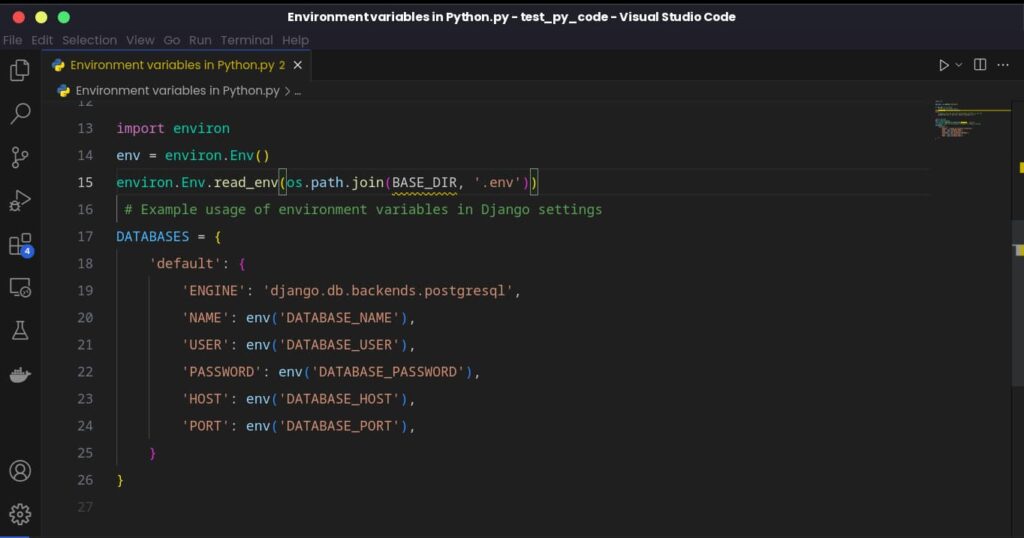
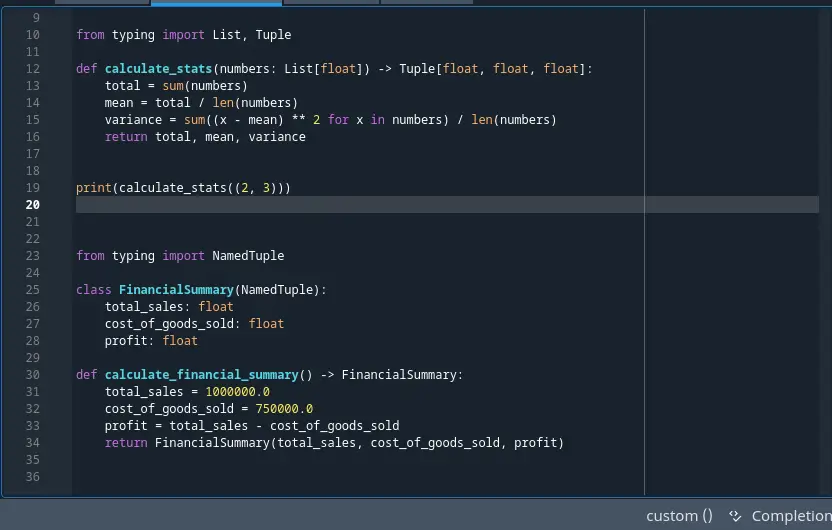
![What does [:i] mean in Python? (Slice Notation in Python)](https://crackondev.com/wp-content/uploads/2023/07/Be-a-hero-and-slice-through-something-1024x812.png)
